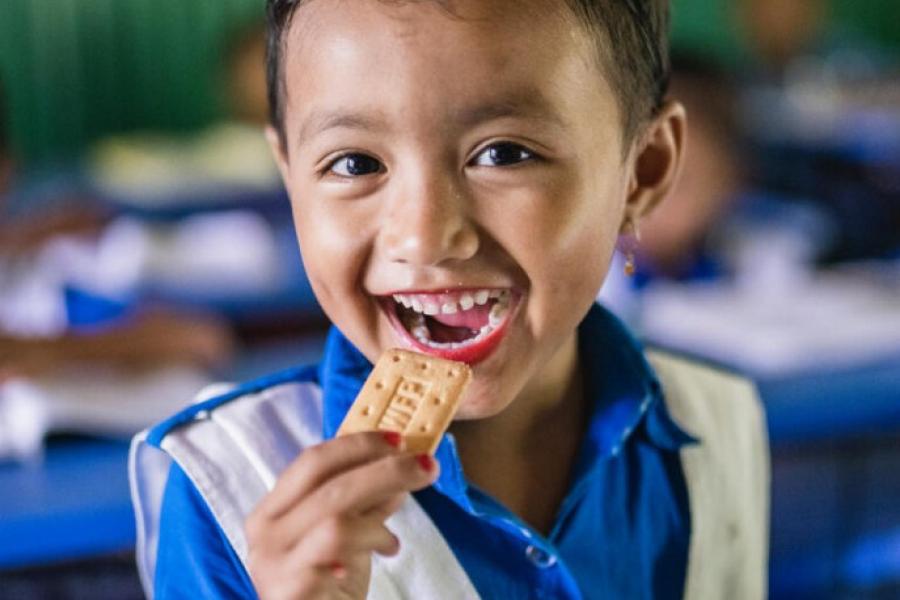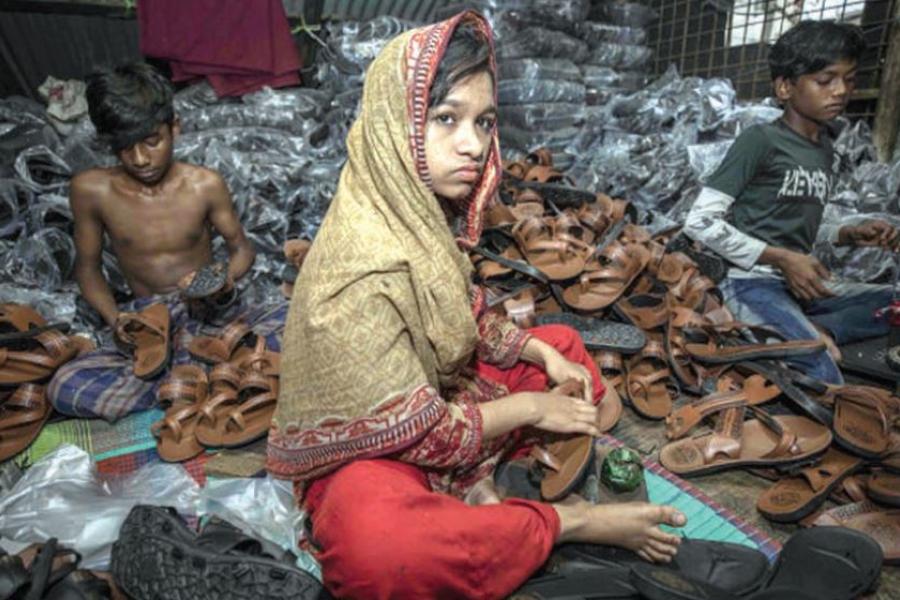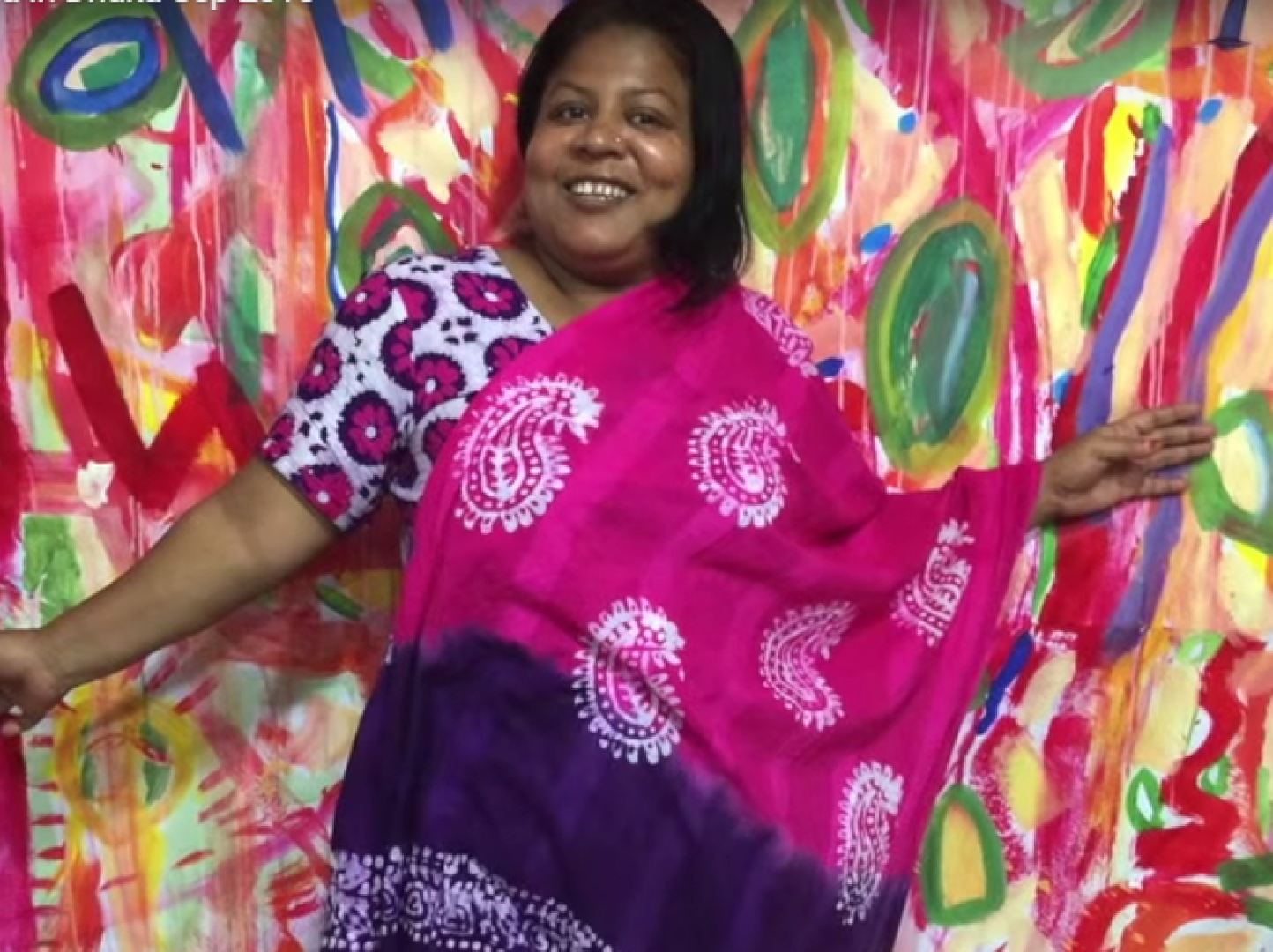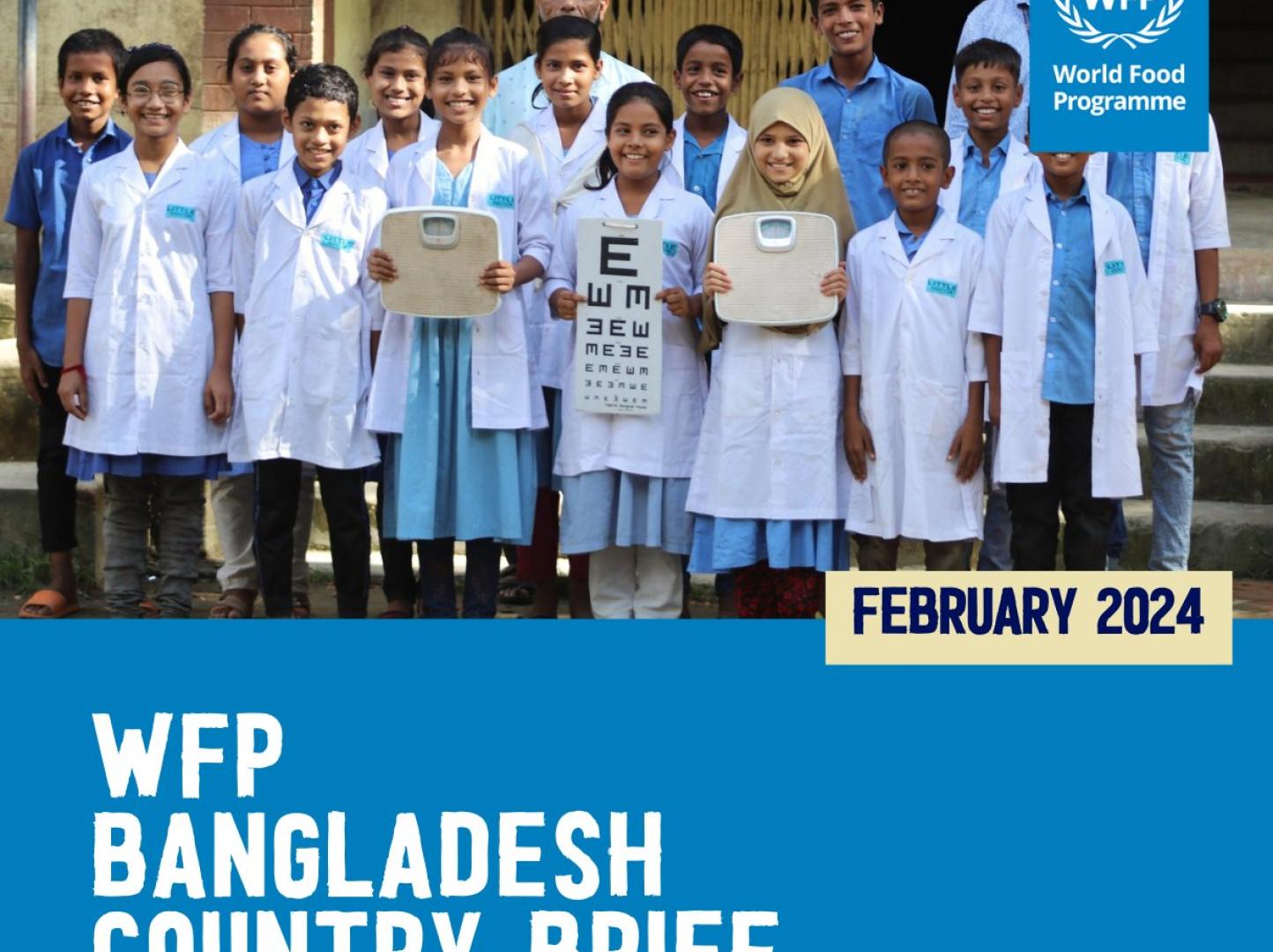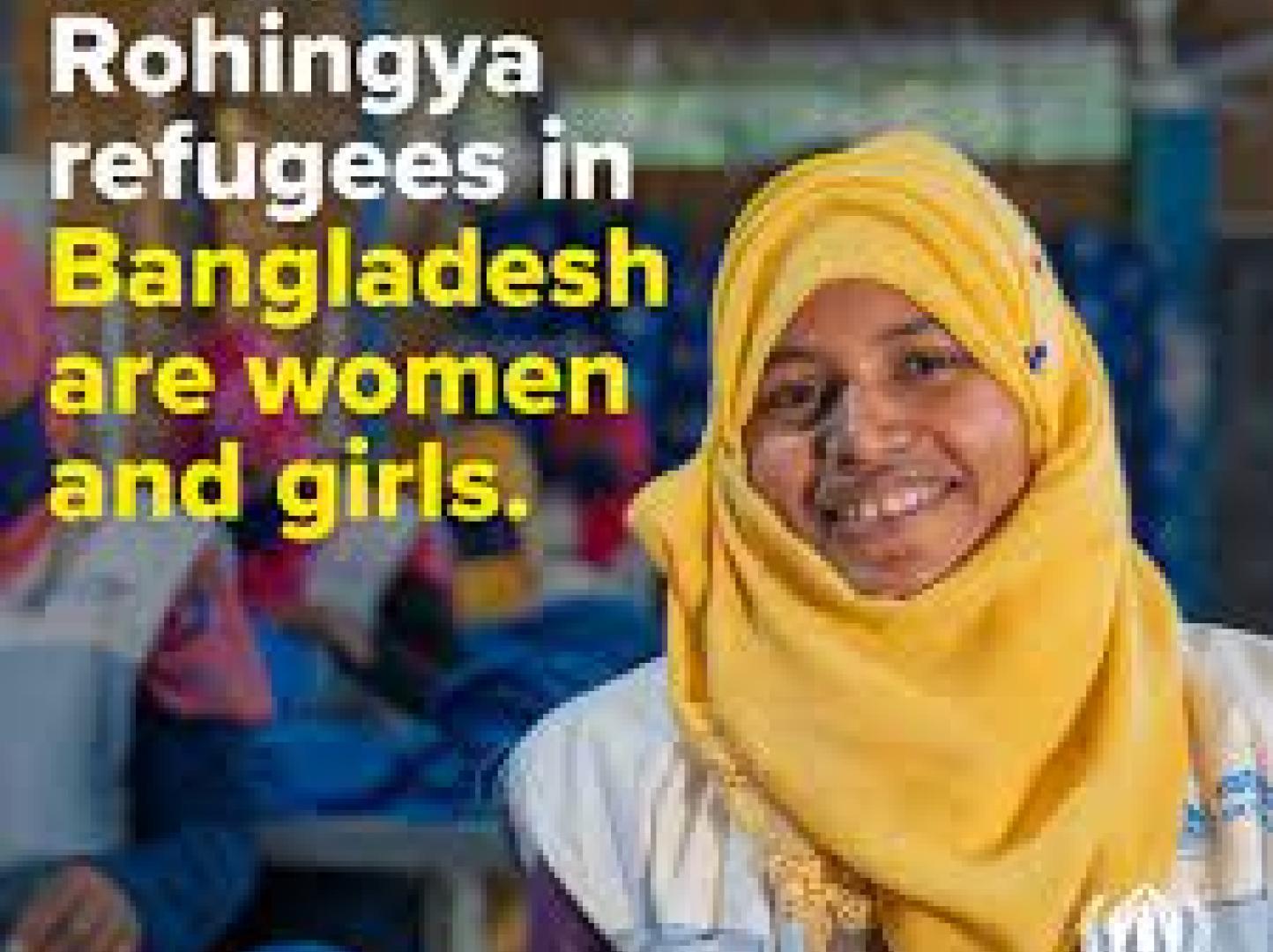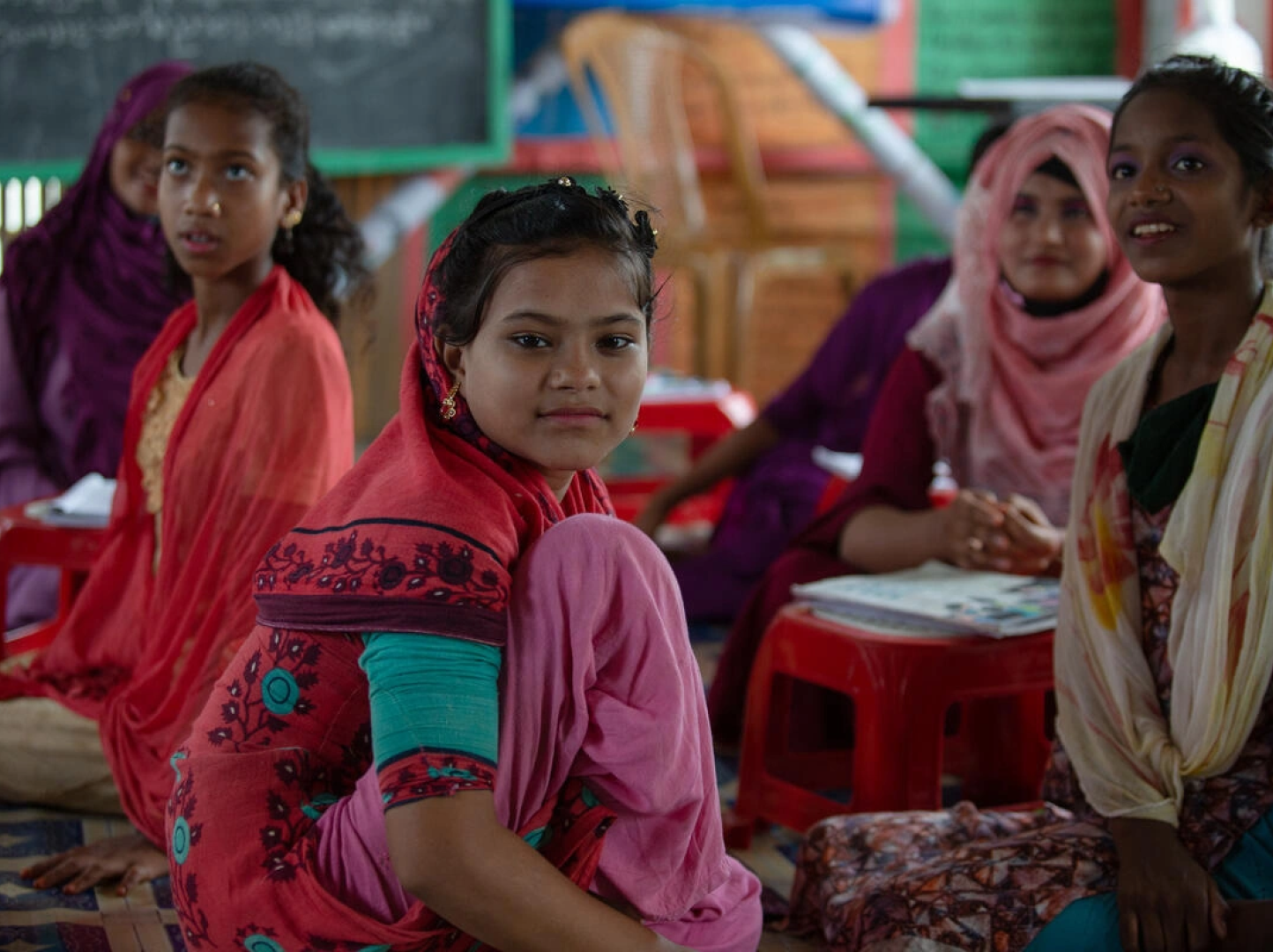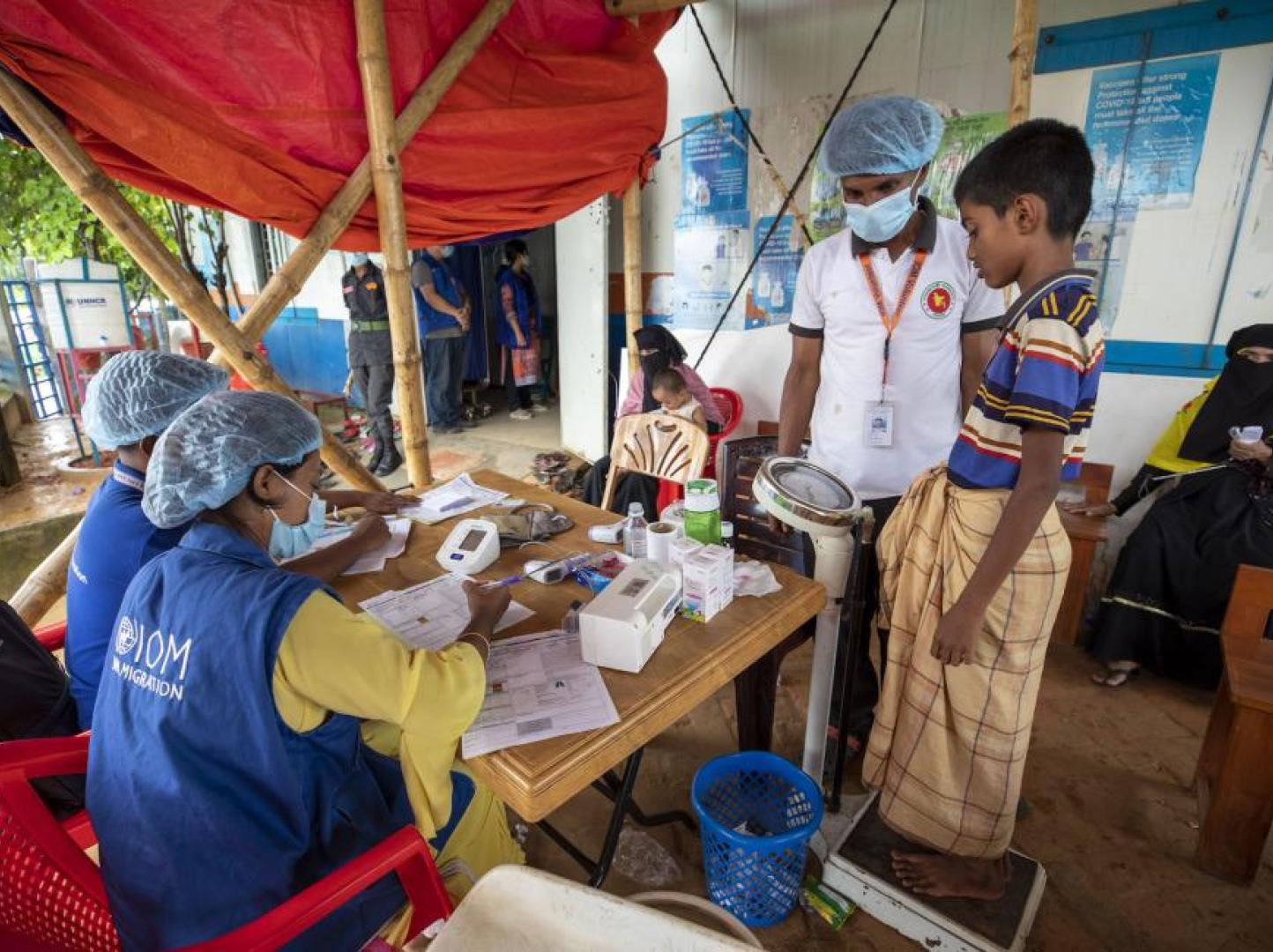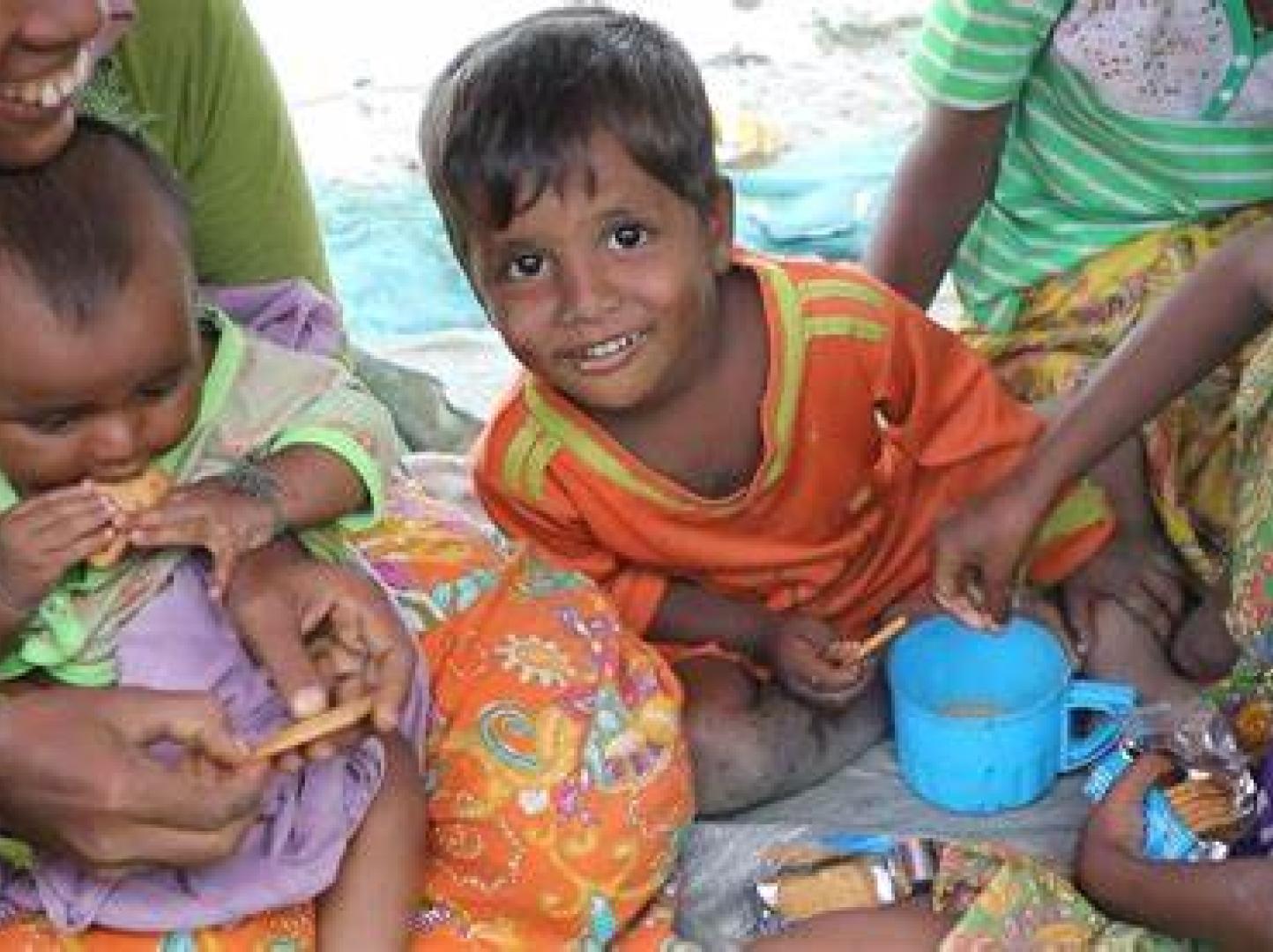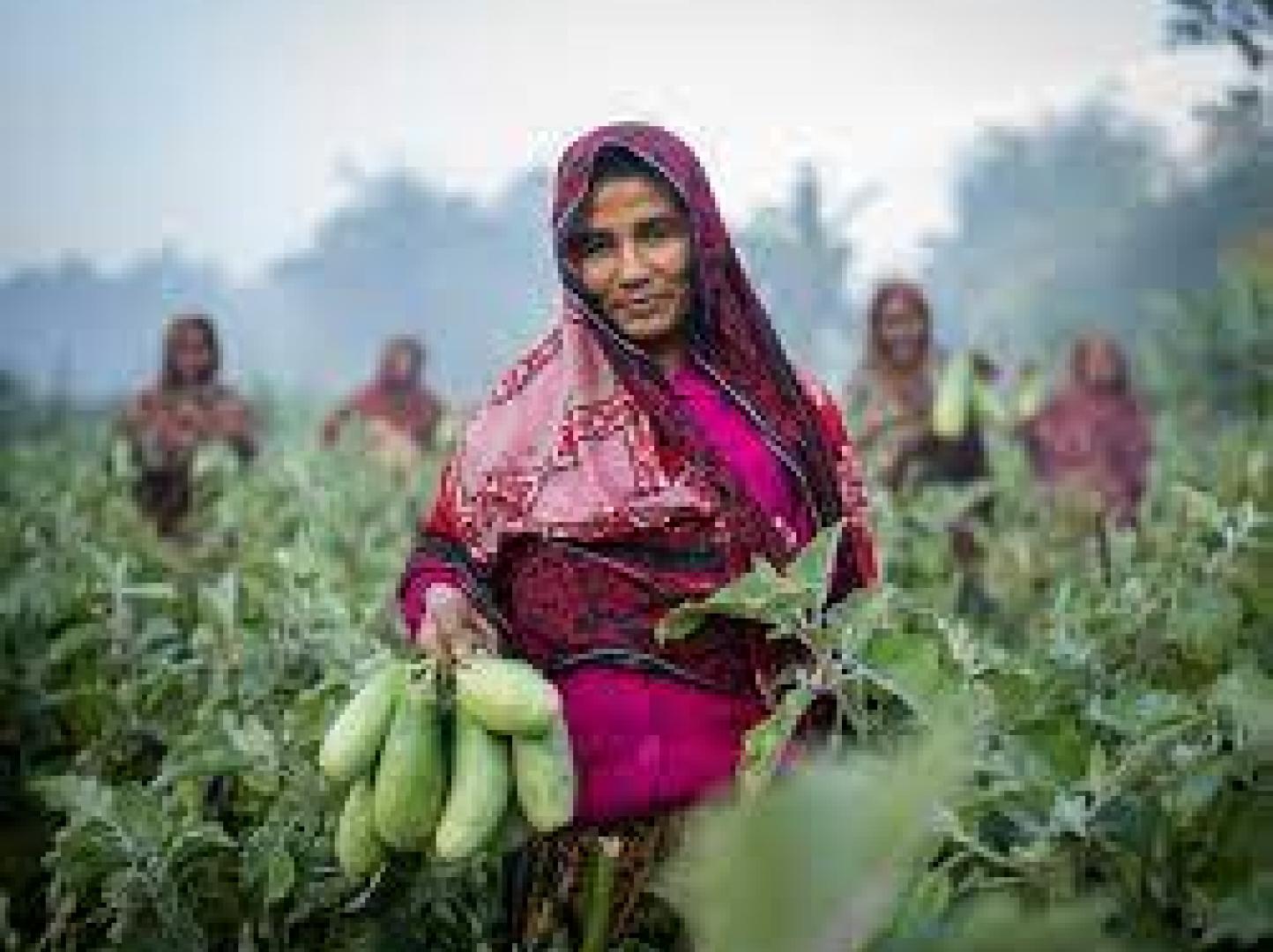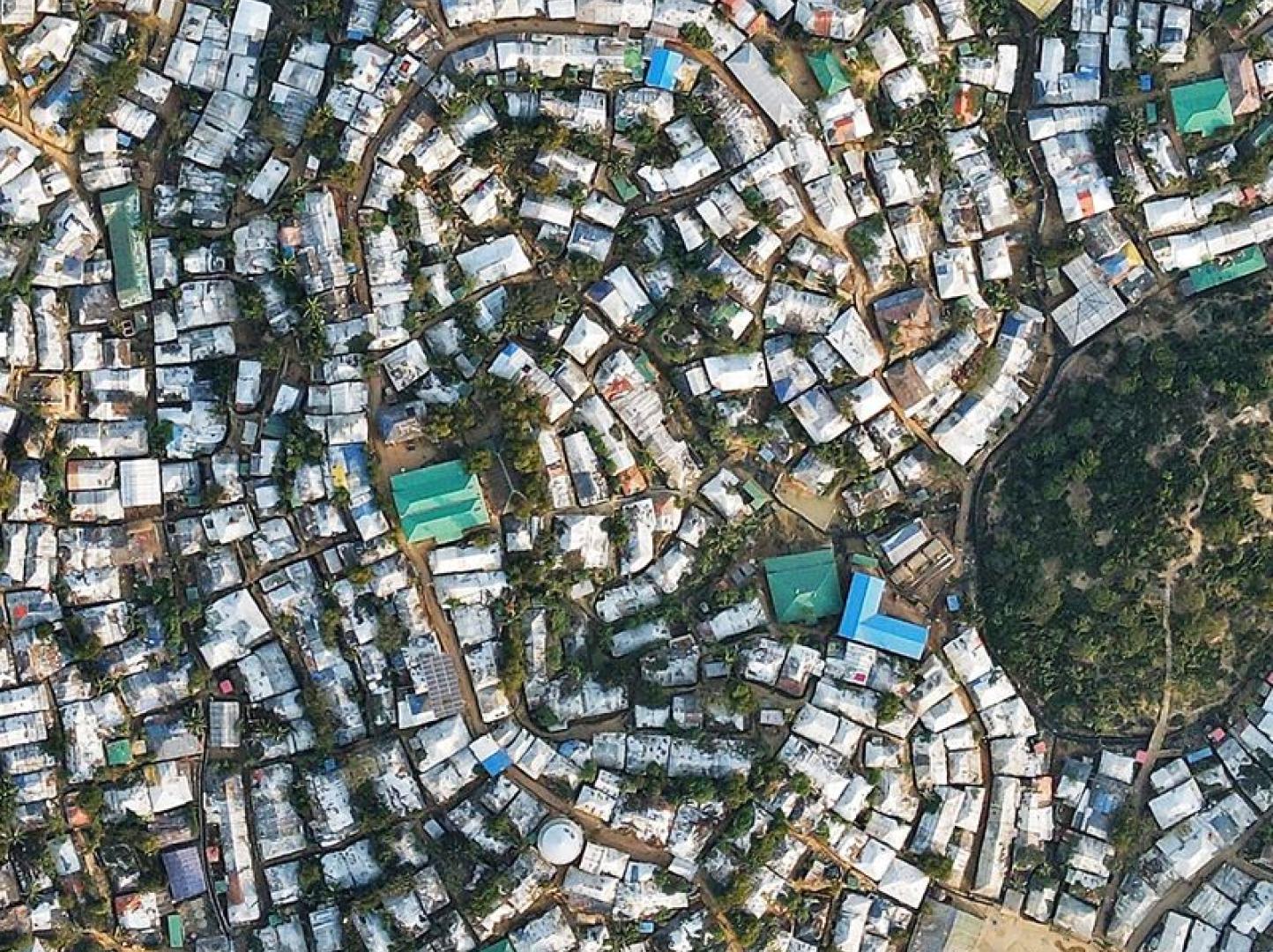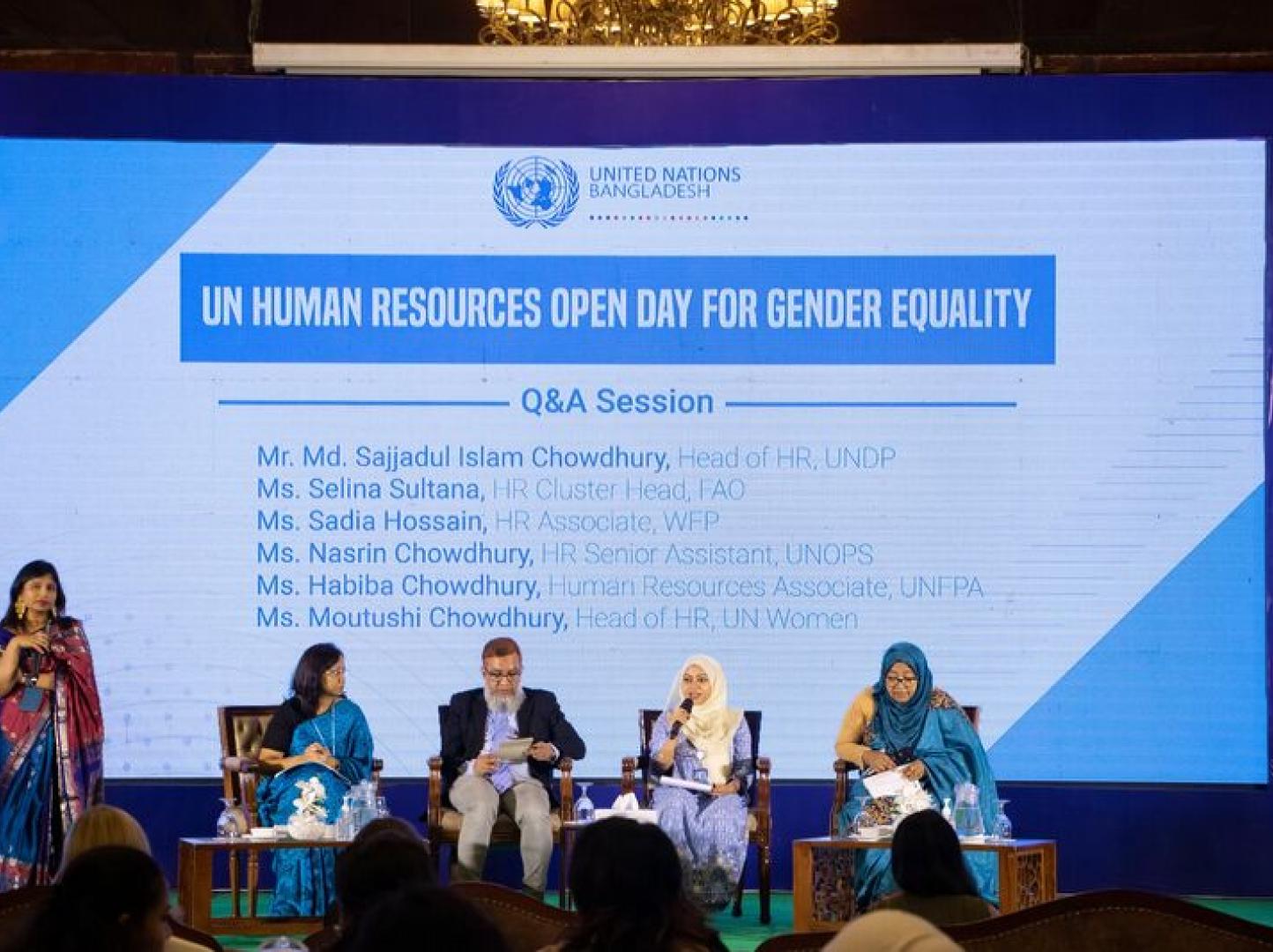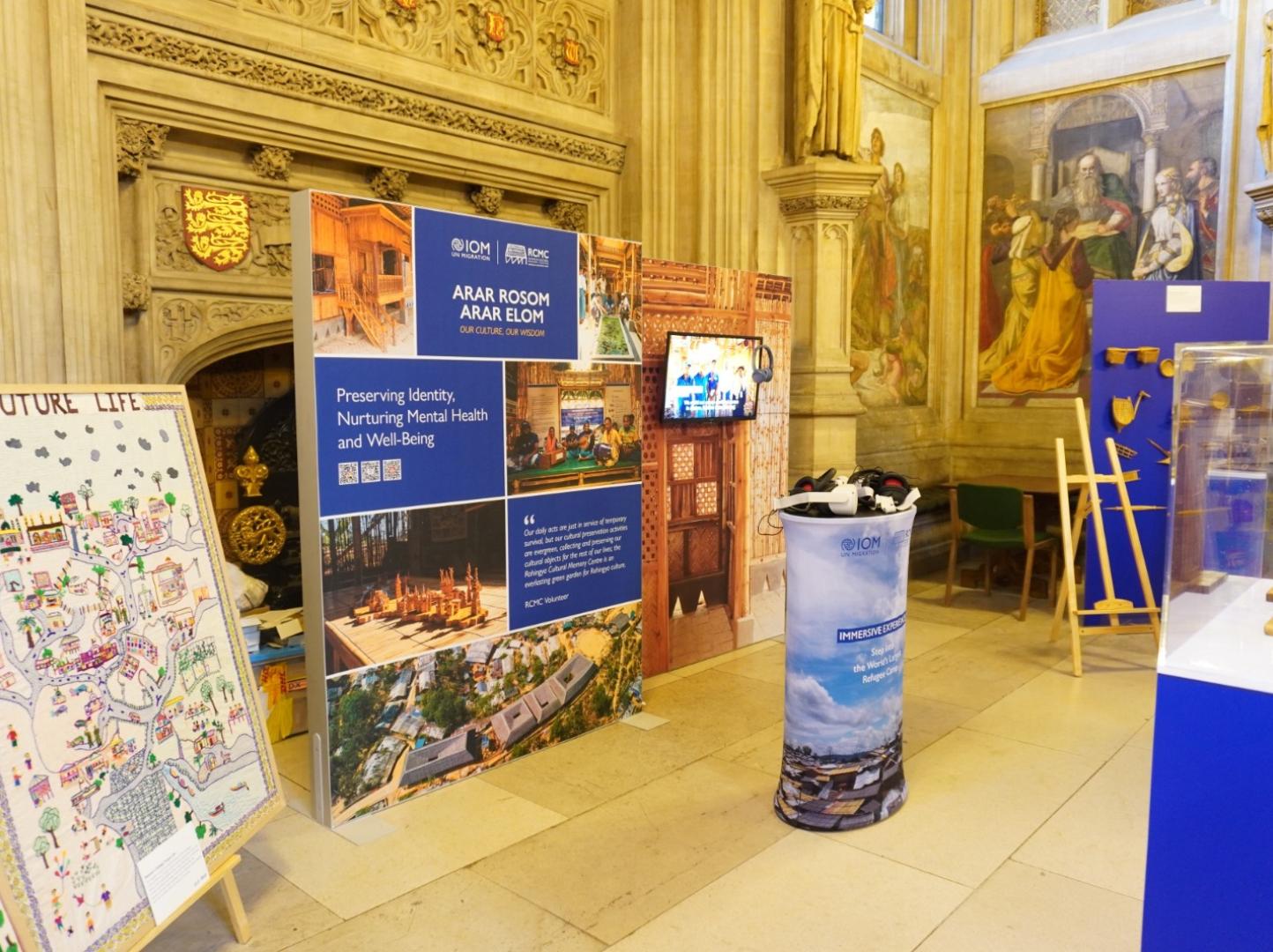Latest
Story
04 April 2024
Blended Investing: Leaving No One Behind for Economic Empowerment
Learn more
Story
03 April 2024
Bangladesh Tripartite Decent Work Country Programme Steering Committee begins 2024 reflecting on progress
Learn more
Story
03 April 2024
National dialogue promotes quality employment and decent work
Learn more
Latest
The Sustainable Development Goals in Bangladesh
The Sustainable Development Goals are a global call to action to end poverty, protect the earth’s environment and climate, and ensure that people everywhere can enjoy peace and prosperity. These are the goals the UN is working on in Bangladesh:
Press Release
01 April 2024
Swedish Crown Princess witnesses Bangladesh's digital progress
Her Royal Highness Crown Princess Victoria of Sweden, during her visit to Bangladesh as a Goodwill Ambassador for the UNDP, observed the significant strides made by the country in achieving digital transformation in an event titled 'Innovate Together for #ZeroDigitalDivide', organized by the ICT Division and Aspire to Innovate-a2i with the support of UNDP. The event was held at the Foreign Service Academy in Dhaka on 18 March. The event underscore Bangladesh's steadfast commitment to realizing a future free of digital disparities, aligning with the Sustainable Development Goals (SDGs) and the vision of leaving no one behind. During the event, the Crown Princess witnessed Bangladesh's exemplary journey in bridging the digital divide through innovative initiatives such as Digital Centres, the National Helpline 333, e-commerce platforms, and freelancer support programs. These initiatives are empowering citizens, particularly young people and entrepreneurs, across Bangladesh, paving the way for inclusive growth and socio-economic development. State Minister Zunaid Ahmed Palak, MP, shared insights into Bangladesh's Digital to Smart Bangladesh Journey, emphasizing how technology is driving social transformation by expanding access to education, healthcare, and economic opportunities. He reiterated Bangladesh's commitment to creating a world with ‘ZeroDigitalDivide’, ensuring equitable access to the benefits of the digital revolution for all citizens. Ulrika Modéer, UN Assistant Secretary-General at UNDP, Johan Forssell, Swedish Minister for International Development Cooperation and Foreign Trade, Alexandra Berg von Linde, Ambassador of Sweden to Bangladesh, were also present during the event along with other senior government officials, UN representatives, and the private sector. Through interactive sessions and exhibitions, participants discussed the transformative impact of Bangladesh's digitalization efforts, emphasizing the opportunities created for individuals from diverse backgrounds. They also discussed Bangladesh's remarkable progress and unwavering commitment to creating a ZeroDigitalDivide world. During the visit to Bangladesh, the Crown Princess will conduct field visits to witness firsthand the positive impact of inclusive digital development on poverty reduction in rural areas. The Crown Princess will also explore initiatives led by women and young entrepreneurs aimed at mitigating the effects of climate change in vulnerable areas, implemented by the government and UNDP.
1 of 5
Press Release
01 April 2024
UNOPS' Roundtable Discussion on the ‘Invest in Women: Accelerate Progress’
Dhaka, Bangladesh - UNOPS Bangladesh hosted the 9th episode of "SDG Café," a monthly roundtable discussion series dedicated to addressing pressing development challenges and co-creating innovative solutions. As part of UNOPS’s commitment to getting Agenda 2030 back on track, this episode places the spotlight on the Sustainable Development Goals (SDG 5), dedicated to advancing gender equality and empowering women in Bangladesh and beyond. This roundtable took place on March 21, 2024 with the theme, ‘Invest in Women: Accelerate Progress’. The session focused on highlighting the importance of investing in women to foster inclusive and sustainable economic growth, in line with SDG 5. Addressing the enduring gender disparities in investment, especially in developing nations, the talks revolved around discussing obstacles, prospects, and inventive approaches to boost investment in businesses owned by women, elevate women into leadership positions, and advance initiatives supporting gender parity. The highlight of the event was the keynote speeches delivered by esteemed personalities Rubana Huq, Vice-chancellor of Asian University for Women and Chairperson of Mohammadi Group, and Azmeri Haque Badhon, renowned Bangladeshi actress. Huq's address emphasized the urgency of accelerating investment in women, drawing from her extensive experience in academia and business leadership. Badhon, known for her impactful advocacy on women's rights and social issues, brought a fresh perspective to the conversation, inspiring attendees with her passionate remarks. Rubana Huq further highlights, "Empowering women isn't just a moral imperative; it's a strategic necessity for global progress. Data consistently show that investing in women yields high returns in economic growth, GDP, social development, and sustainability. We must accelerate our efforts to bridge the gender gap. By harnessing the full potential of women, we unlock solutions to some of the world's most pressing challenges." She emphasized on the significant yet often overlooked contribution of women to Bangladesh's economy, particularly through their engagement in domestic work. Currently, women contribute around 20 percent to the country's economy. However, if the government were to formally recognize and account for the value of domestic work performed by women, their contribution to the GDP could nearly double, potentially reaching close to 50 percent. The recognition of domestic work would lead to a substantial shift in how women's economic participation is perceived and measured. Currently, a significant portion of women's labor, which is primarily focused on household chores and caregiving responsibilities, is not considered in traditional economic indicators. By acknowledging and valuing this work, it would not only reflect a more accurate representation of women's economic activity but also lead to broader implications for policy-making and social change. The Country Manager of UNOPS in Bangladesh, Sudhir Muralidharan acknowledged the gravity of the situation and the crucial need for collaborative efforts. He stated that, "As we commemorate International Women's Day 2024, let us reaffirm our commitment to gender equality and women's empowerment. Recent data underscores the urgency of our mission: globally, women continue to face significant barriers to full participation in society and the economy. According to the World Economic Forum's Global Gender Gap Report 2023, at the current rate of progress, it will take 162 years to close the Political Empowerment gap, 169 years for Economic Participation and Opportunity, and 16 years for Educational Attainment. Despite progress, South Asia still lags behind, with only 63.4% gender parity achieved. While countries like Bangladesh, Bhutan, and Sri Lanka show promise, others struggle to keep pace. As UNOPS Country Manager, I am committed to accelerating efforts to bridge these divides and ensure a future where every individual, regardless of gender, can thrive and prosper with dignity. Let's unite to transform these statistics into stories of progress and equality." Azmeri Haque Badhon, renowned Bangladeshi actress mentioned, "As an actress, my journey has been enriched by projects like 'Rayhana Mariam Noor', 'Khufiya' and so on, where I've had the privilege to delve into complex narratives that spotlight the resilience and strength of women. These films not only showcase the diverse experiences of Bangladeshi women but also challenge societal norms surrounding gender roles. In my personal life, I've encountered both triumphs and challenges including getting the legal guardianship of my daughter, navigating the expectations placed on women in the entertainment industry. However, each experience has only fueled my determination to advocate for gender equality on and off the screen. Through my work and personal endeavors, I strive to inspire others to embrace their authenticity and fight for a world where every individual is empowered to thrive regardless of gender." Following the keynote speeches, an open discussion ensued, allowing participants to exchange ideas, share experiences, and explore collaborative opportunities in advancing gender equality and women's economic empowerment. The roundtable discussion sought to facilitate investment in women and address the gender gap in Bangladesh and beyond. This SDG Café convened essential stakeholders in Bangladesh, including government representatives, international organizations, and development partners like the Department of Women Affairs (DWA), Armed Forces Division (AFD), Asian Development Bank (ADB), UN agencies, academics, and emerging local entrepreneurs. Through meaningful dialogue, they provided guidance and proposed innovative strategies and suggestions to promote gender equality and support investing in women. For media inquiries, please contact: Musfika Sultana Communications Focal Email: musfikaS@unops.or
1 of 5
Press Release
12 March 2024
The Government, with UNICEF support, accelerates efforts in combating violence against children and child marriage in Bangladesh
DHAKA, 11 March 2024 - The Ministry of Women and Children Affairs (MoWCA), with technical support of UNICEF, today launched the "National Multimedia Campaign on Prevention of Violence Against Children (VAC) and Child Marriage (CM).” The initiative is a part of the ongoing efforts of the Accelerating Protection for Children (APC) project led by MoWCA and UNICEF to address the alarming prevalence of violence against children and child marriage in Bangladesh. The project is focused on strengthening institutional capacity and establishing a system for child protection at national and sub-national level. "Today’s launching is a pivotal moment in our ongoing mission to protect the rights and dignity of children in Bangladesh," stated Ms. Simeen Hussain (Rimi), Honorable State Minister, Ministry of Women and Children Affairs. "Violence against children and child marriage not only violates their fundamental rights but also has enduring detrimental effects on their physical, emotional, and psychological well-being. The government is committed to working hand in hand with UNICEF and other stakeholders to eradicate these harmful practices and create a safe and nurturing environment for all children," she added. Supported with funding from the European Union and the Foreign, Commonwealth & Development Office (FCDO), the campaign is aligned with the National Children’s Policy to uphold the rights of children and the National Action Plan (NAP) to eliminate child marriage in Bangladesh by 2041. "The campaign underscores our unwavering dedication to empower communities to champion child protection," expressed Emma Brigham, Representative a.i. UNICEF Bangladesh. "Through strategic communication and community mobilization, we aim to create an environment where every child can thrive free from violence and exploitation. We call any concerned person to call Child Helpline 1098, the toll-free nationwide number, providing counselling and referrals to protection, legal aid, shelter, health, and education services.” Dr. Bernd Spanier, Chargé d'Affaires of the EU Delegation in Bangladesh, expressed support for the initiative, reiterating the fact that "the European Union stands in solidarity with Bangladesh in its endeavours to safeguard children's rights. We commend the Government of Bangladesh and UNICEF for kick-starting this much needed campaign to address violence against children and child marriage." The Multiple Indicator Cluster Survey (MICS) 2019 revealed that almost 9 out of 10[1] children aged between 1 to 14 years have encountered instances of physical violence and psychological aggression within their homes. In addition, Bangladesh ranks among the top 10 countries globally with over half of girls[2] married before becoming 18, almost one out of four girls have given birth before the age of 18, while eight out of 10 have given birth before reaching the age of 20. Drawing from evidence, the campaign will provide a comprehensive approach to facilitate behavioral change through Public Service Announcement (PSA) and initiate a social movement against violence and child marriage. It will prioritize community engagement in hard-to-reach areas and districts with a high prevalence of violence against children and child marriage and reinforce collaborative action to challenge harmful social norms while advocating for positive parenting practices. For more information please contact:Farjana Sultana, UNICEF Bangladesh, Tel: +880 191 151 9507, fasultana@unicef.orgFaria Selim, UNICEF Bangladesh, Tel: +880 181 758 6096, fselim@unicef.org [1] An estimated 89 percent of children.[2] 51.4 percent
1 of 5
Story
01 April 2024
Conservation Efforts by Ethnic Communities in Bangladesh Bolster Water Security
Just a few years ago, Sudarshana Chakma (35), a resident of the remote Digholchari Debarmatha village under Bilaichari upazila in the Rangamati Hill District, had to traverse a long hilly path to fetch water for her household because there were no local water sources.“Unchecked deforestation and degradation of village common forests (VCFs) led to the drying up of all-natural water sources in our village. We struggled to collect drinking and household water,” Chakma explained to IPS. Ethnic communities in the Chittagong Hill Tracts (CHT) rely significantly on forests for their lives and livelihoods. They gather water from natural sources like streams and practice jhum (shifting cultivation) in nearby forests. However, indiscriminate deforestation of the natural resources had dried up springs and streams, causing water scarcity in many areas.The tide turned when the USAID-funded Chittagong Hill Tracts Watershed Co-Management Activity (CHTWCA) engaged surrounding communities, including those living in Digholchari Debarmatha village, as conservation volunteers to protect Village Common Forests (VCFs) in 2020. This initiative successfully revived springs, ensuring a year-round water supply.The Strengthening Inclusive Development in Chittagong Hill Tracts Project, which the Ministry of Chittagong Hill Tracts Affairs implemented, has transformed many lives, including Chakmas’.“Now we can easily fetch water from nearby springs, bringing peace to our lives. Due to the arduous journey ethnic women had to make to fetch water, quarrels over who was going to fetch the water were common in the village and among families. Now, we live in harmony,” said Sudarshana, a mother of four.Silica Chakma of Digholchari Hajachara village echoed her sentiments, highlighting the voluntary conservation efforts by ethnic communities to ensure an adequate water supply during the dry season.“Before the restoration of our forests, we faced water scarcity. Now, we have no water crisis, as we collect water four to five times a day from the springs revived in the forests,” she said.Silica emphasised that village common forests are conserved voluntarily, with strict regulations against harvesting forest resources without the approval of VCF management committees.Barun Chakma, President of the Digholchari Debarmatha VCF Management Committee, emphasised the shift in mindset, stating that locals now protect the forests voluntarily, contrasting with past practices where trees were felled indiscriminately.Enhancing Small Agriculture SustainabilityThe CHT faces aggravated water crises during the dry season, impacting agriculture and homesteads.To address this, local ethnic farmers in Digholchari Debarmatha have constructed bamboo-made dams on streams, creating water reservoirs fed by springs from the village common forest.Pujikka Chakma, a 45-year-old female farmer, is grateful for the progress.“After conserving the local forests, farmers do not face water scarcity for their agriculture and homesteads. We store spring water in the reservoir to irrigate cropland during the dry season.”Thirty-seven-year-old Lika Chakma also acknowledged the benefits of the expanded use of spring water in agriculture, including cultivating various crops and ensuring food security for the community.Conserving Medicinal PlantsIn addition to addressing water security, ethnic communities in the Rangamati Hill District have been actively conserving medicinal plants for healthcare and treatments.Lika Chakma explained, “We conserve medicinal plants in our local forests for use when we fall sick.”Poitharam Chakma emphasised the importance of these efforts, given limited access to healthcare facilities in remote hilly areas. “Once our forests were degraded, we faced problems collecting medicinal plants. Now, we are conserving those in our forests.”Barun Chakma provided details of the planting, a few years ago, of various medicinal plants, including Haritaki (myrobalan), Bohera (Terminalia bellirica), and Amloki (Indian gooseberry), in the Digholchari Debarmatha VCF. While acknowledging that it will take time for these plants to yield herbal medicines, he expressed confidence in the community’s ability to support health treatments in the future.The conservation initiatives run by ethnic communities in Bangladesh address issues with water security, support agricultural sustainability, and protect priceless medicinal plants.This is an IPS UN Bureau Report.
1 of 5
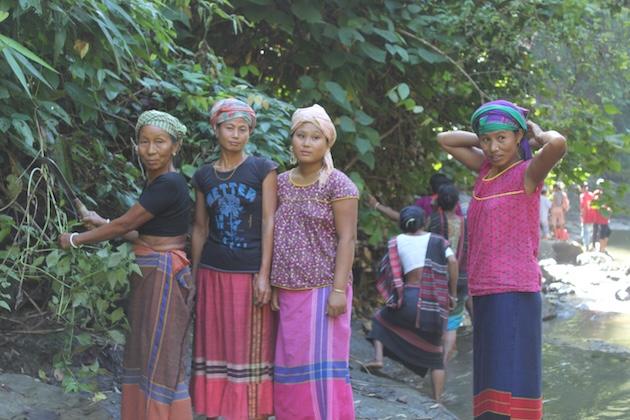
Press Release
06 March 2024
WFP and MoDMR Sign MoU to Enhance Humanitarian Operations on Bhasan Char
Dhaka, Bangladesh – The United Nations World Food Programme (WFP) has signed two Memoranda of Understanding (MOUs) with the Ministry of Disaster Management and Relief (MoDMR) of Bangladesh aimed at enhancing the humanitarian operations for the Rohingya refugees on Bhasan Char Island.The MoUs were signed by Md. Kamrul Hasan, ndc, Secretary, MoDMR and Dom Scalpelli, WFP Country Director, in the presence of the new State Minister, Md, Mohibbur Rahman, MP, on 4th March in Dhaka. With the signing, MoDMR officially handed over the management of the United Nations common accommodation and office space, and the warehouse facilities to WFP, co-lead of the Food Security Sector and lead of the Common Services Sector of the Rohingya refugee response. "This MoU signifies a pivotal step in enhancing our logistical support to the humanitarian community and the Rohingya refugees currently residing on the island. It will also boost WFP’s operational capacity by directly managing and maintaining the warehouses, contributing significantly to the effectiveness and efficiency of our assistance to the Rohingya refugees. We thank MoDMR for their longstanding support and collaboration, and we look forward to continuing working together to serve this vulnerable group,” said Dom Scalpelli, WFP Country Director. As the Common Services Sector lead, WFP coordinates with the government on behalf of the UN and other humanitarian partners. Following the signing, WFP is committed to raising the resources needed to improve and upkeep the conditions of the accommodation, office and warehouse facilities to ensure quality service is provided to both humanitarians and the Rohingya refugees. Media Contact:Kun Li, Head of Communication, WFP BangladeshMobile: +880 1322846137 Email: kun.li@wfp.org
1 of 5
Story
04 April 2024
Blended Investing: Leaving No One Behind for Economic Empowerment
UNAIDS has recently contributed to financing seven start-ups, by Transgender and retired sex workers in collaboration with UNCDF, who selected these businesses by applying UNCDF’s own due diligence process, and through approval by a Gender Responsive Investment Platform set up at the central bank of Bangladesh. The fundamental rationale behind the investment strategy is that by increasing the availability of domestic financial resources (both public and private) to support economic opportunities at the local level for minority groups, so that they will be better equipped to achieve lasting enhancements in their income and economic stability. These investments contribute to SDG goals 5 (gender equality) and 8 (decent work and economic growth). Within this initiative, UNCDF has allocated two types of resources: human capital, which includes training, skills development, entrepreneurship support, and employment opportunities, as well as financial capital in the form of grants. These investments have been directed towards local businesses in specified regions, with a specific focus on gender responsive projects that primarily benefit women and girls, ultimately leading to the creation of more job opportunities for them.We are sharing stories of these seven start-ups here:Uttoron Gents Parlor In the town of Manikganj, Anonnya Banik emerges as a powerful force for change within the transgender community. Through her courageous initiative, Uttoron Gents Parlor, established in 2019, she transformed a simple gents parlor into a sanctuary of empowerment. Anonnya's vision extended beyond mere entrepreneurship; it aimed to challenge societal norms and provide sustainable opportunities for transgender individuals who face discrimination and marginalization in Bangladesh. Despite the long-standing challenges and prejudices faced by the transgender community, Anonnya Banik's determination remained unyielding. She recognized the untapped potential within her community and sought to reintegrate transgender individuals into society as entrepreneurs, breaking down barriers of discrimination and bias.Anonnya's commitment was not just lip service; she actively engaged transgender individuals as employees, providing them not only with jobs but also with a platform to showcase their talents and capabilities. Anonnya's pioneering efforts ignited conversations on inclusion and acceptance, serving as a model of empowerment for the broader community. UNCDF is proud to be a part of this inspiring journey of empowerment.Through this investment, key positive changes made:With support from UNCDF, a comprehensive business plan and capital budget were prepared for the parlour which included a business financial model capturing details such as sales, growth, revenue, operational and capital costs, assets, and equity. Grants from UNCDF, along with loans from banks, facilitated the renovation and modernization of the parlor, enhancing its appeal to a wider customer base. Lastly, Uttoron experienced significant increases of customers, the business expanded its human resource capacity by hiring three transgender individuals. SHOW Fashion House In Manikganj, Bangladesh, SHOW Fashion House, led by Aleya Akter Lily, stands as an encouragement of empowerment and change. Founded with a vision to provide dignity and opportunity to retired sex workers, the fashion house employs eight women who seek to transition to alternative livelihoods. Beyond selling clothes, it offers a sanctuary of possibilities, rewriting destinies and fostering independence. Aleya plans to expand the business by integrating new equipment and hiring more staff, aiming to empower more women seeking to exit the sex work industry. SHOW Fashion House represents more than just fashion; it embodies a narrative of empowerment, resilience, and societal transformation, offering a chance for women to reclaim their dignity and independence in the face of adversity.Through this investment, key positive changes made:UNCDF supported preparing a comprehensive business plan for the boutique and capital budgeting, which included a business financial model capturing details such as sales, growth, revenue, operational and capital costs, assets, and equity. UNCDF also facilitated in connecting with commercial banks. Using grants from UNCDF and loans from banks, she refurbished her showroom and purchased sewing machines to boost production and provide training opportunities for individuals like herself who aspire to learn. With a notable surge in customer demand, Aleya enhanced her workforce by recruiting 5 elderly sex worker.
1 of 5

Story
03 April 2024
National dialogue promotes quality employment and decent work
Today, Government, industry and labour sector stakeholders convened in Dhaka for a national dialogue on Promoting Decent Work for Social Justice, underscoring Bangladesh's commitment to labour reform for equitable and sustained growth as the country prepares for sustainable graduation to an upper middle-income, developing country by the end of this decade. Organized jointly, by the Ministry of Foreign Affairs, the Ministry of Labour and Employment, and the International Labour Organization at the Foreign Service Academy, the dialogue aimed at engaging the stakeholders on key issues, with a call for actionable outcomes for quality employment and decent work. The dialogue brought together diverse views contributing to shaping a future where decent work and competitiveness of businesses are ensured and supported by national development strategies. It facilitated constructive conversations, knowledge-sharing, and partnership-building among government officials, employers, workers, think tanks, private sector representatives, and development partners. As the Chief Guest, State Minister for the Ministry of Labour and Employment, Md. Nazrul Islam Chowdhury, in his address, emphasized the government's commitment to labour reform. "Our dedication to promote decent work and advance social justice remain steadfast. Together, we will build a Bangladesh where all worker's rights are protected, and their contributions valued" he stated. Masud Bin Momen, the Foreign Secretary of Bangladesh, underscored the importance of the multi-stakeholder dialogues on certain labour related issues, stating, "Employment generation and Decent work are in the highest priorities during the present five-year term of the current government. These principles are deeply integrated in our national development strategies, including the GB roadmap (2021-2026) and National Action Plan on the Labour Sector of Bangladesh (2021-2026). These are essential for fostering sustainable growth, including increased trade and investments.” Following suit, Mahbub Hossain, Secretary of the Ministry of Labour and Employment, said, "Our joint efforts have generated concrete, actionable policies aimed at improving the livelihoods of our workforce as well as safeguarding their fundamental rights and safety in the workplace." ILO Country Director for Bangladesh, Tuomo Poutiainen, remarked "To support successful LDC graduation, Bangladesh must advance key development goals, including prioritizing jobs creation, evidence-based wage policies and robust OSH standards. The ILO continues to stand as a committed partner to the Government of Bangladesh in achieving these objectives.” The discussions delved into three key panel discussions: the Global Accelerator for Jobs, the development of an Evidence-Based National Wage Policy and advancing Occupational Safety and Health (OSH) in Bangladesh. Each segment shed light on the challenges and opportunities within the world of work. Key stakeholders from the government, employers, and workers gave valuable insights and emphasized the need for a collective approach to ensure decent work and foster social justice. For media queries and information, please contact:AHM Masum BillahDirector (Public Diplomacy), MoFA, 01754-068520Md Sariful IslamCommunications OfficerILO Bangladesh, 01915 631608, islammds@ilo.org
1 of 5
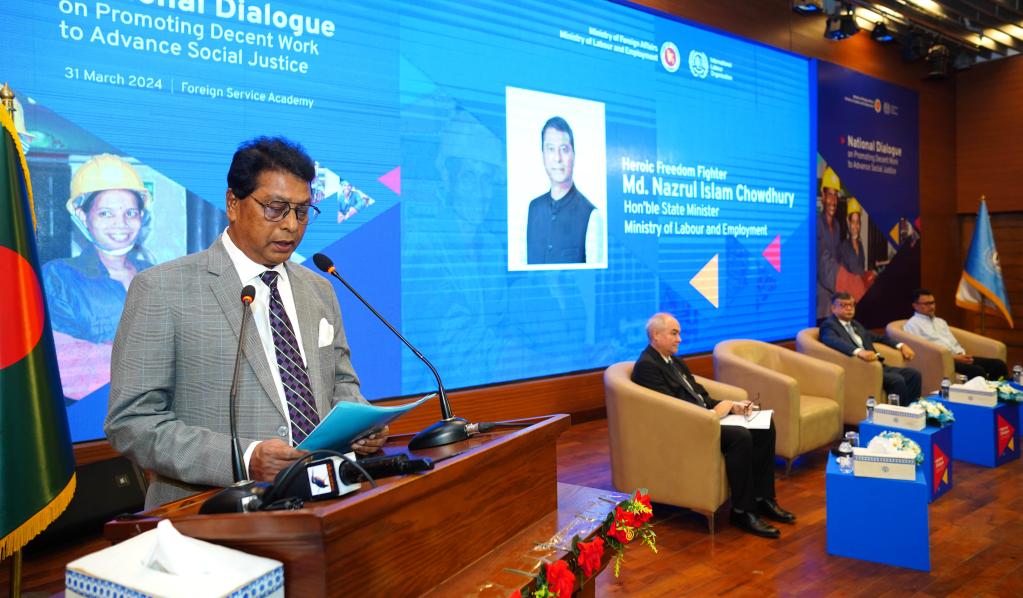
Story
03 April 2024
Bangladesh Tripartite Decent Work Country Programme Steering Committee begins 2024 reflecting on progress
The Bangladesh Decent Work Country Programme (DWCP) Steering Committee comprising representatives from the Ministry of Labour and Employment (MOLE), the Bangladesh Employers’ Federation (BEF) and the National Coordination Committee for Workers’ Education (NCCWE) held their first meeting of the year on 31 January 2024 to reflect on the progress towards increasing decent jobs as the country gears for LDC graduation.
The Ministry of Labour and other tripartite constituents – workers’ and employers’ organisations discussed how to implement the national action plan that will consolidate ongoing reforms in the labour sector and position the country for solid economic growth after LDC graduation in 2026.
In addition to supporting reforms in labour administration and governance, the ILO together with constituents have contributed to monumental reforms in skills development leading to adoption of the Bangladesh National Qualification Framework (BNQF) for skills in March 2023, and the successful rollout of a pilot employment injury scheme over the past two years, providing compensation and income security for workers and their families in the event of injury at work or work-related death.
The ILO continued to foster social dialogue on key issues impacting creation of decent employment in support of the Government’s vision of creating 30 million jobs by 2030 and advancing universal social protection.
Labour Secretary Md. Ehsan E Elahi reported that the Government had formulated the country’s first-ever National Employment Policy 2022 and was leveraging social dialogue to develop alternative dispute resolutions mechanisms.
“We have the Industrial Relations Institute for capacity building of employers and workers to promote harmonious industrial relations in Bangladesh,” the Labour Secretary said. “Building social awareness and capacity is needed to ensure effective social dialogue as is being done by the Department of Labour,” said Elahi.
The Decent Work Country Programme Steering Committee, which meets twice a year, is the primary champion of SDG 8 – promoting creation of decent work and economic growth.
The Chairman of the Bangladesh Employment Federation (BEF) Ardashir Kabir commended the DWCP for addressing the key factors required to create decent employment including promoting the adoption and implementation of international labour standards and workers’ rights, addressing gender inequality in the world of work, and the elimination of gender-based violence.
“The significance of DWCP lies in its coverage of skills training programmes, employment policies and programmes, social protection schemes, labour rights and other related issues,” Kabir said. “BEF recognizes the success of the DWCP, hinges on effective collaboration, dedication and engagement of all stakeholders including employers’ organizations, trade unions and the government at both national and local levels.”
He called for regular progress updates so that partners can continue to be informed and participate in influencing positive changes on decent work and underscored the need for cooperation among all stakeholders to ensure successful implementation of the Decent Work Country Programme 2022-2026.
Kabir also emphasized the importance of businesses embracing human rights as the country prepares for LDC graduation in 2026 to retain competitiveness and sustainability in global supply chains.
“We should raise awareness among both employers and employees about responsible business conduct. We also want to highlight the benefit businesses can get from alternative dispute resolution methods, which are essential for maintaining decent work environments,” he added.
The representative of the National Coordination Committee for Workers’ Education (NCCWE) Naimul Ahsan Jewel reiterated NCCWE’s commitment to taking forward adoption and implementation of international labour standards.
“If we are to make progress in the SDGs, the increased participation of workers’ organisations in labour law reforms is crucial,” said Jewel.
The ILO Country Office also briefed the Steering Committee on the Global Coalition for Social Justice endorsed by the ILO Governing Body in November 2023, and the Global Accelerator on Jobs and Social Security for Just Transitions, a UN initiative launched in September 2021 by UN Secretary-General to accelerate progress towards the creation of decent jobs, primarily in the green, digital and care economies, and to extend social protection to people who are excluded.
The DWCP Steering Committee expressed interest in learning more about the modalities of joining the Global Accelerator on Jobs and Social Security.
The Ministry of Labour and other tripartite constituents – workers’ and employers’ organisations discussed how to implement the national action plan that will consolidate ongoing reforms in the labour sector and position the country for solid economic growth after LDC graduation in 2026.
In addition to supporting reforms in labour administration and governance, the ILO together with constituents have contributed to monumental reforms in skills development leading to adoption of the Bangladesh National Qualification Framework (BNQF) for skills in March 2023, and the successful rollout of a pilot employment injury scheme over the past two years, providing compensation and income security for workers and their families in the event of injury at work or work-related death.
The ILO continued to foster social dialogue on key issues impacting creation of decent employment in support of the Government’s vision of creating 30 million jobs by 2030 and advancing universal social protection.
Labour Secretary Md. Ehsan E Elahi reported that the Government had formulated the country’s first-ever National Employment Policy 2022 and was leveraging social dialogue to develop alternative dispute resolutions mechanisms.
“We have the Industrial Relations Institute for capacity building of employers and workers to promote harmonious industrial relations in Bangladesh,” the Labour Secretary said. “Building social awareness and capacity is needed to ensure effective social dialogue as is being done by the Department of Labour,” said Elahi.
The Decent Work Country Programme Steering Committee, which meets twice a year, is the primary champion of SDG 8 – promoting creation of decent work and economic growth.
The Chairman of the Bangladesh Employment Federation (BEF) Ardashir Kabir commended the DWCP for addressing the key factors required to create decent employment including promoting the adoption and implementation of international labour standards and workers’ rights, addressing gender inequality in the world of work, and the elimination of gender-based violence.
“The significance of DWCP lies in its coverage of skills training programmes, employment policies and programmes, social protection schemes, labour rights and other related issues,” Kabir said. “BEF recognizes the success of the DWCP, hinges on effective collaboration, dedication and engagement of all stakeholders including employers’ organizations, trade unions and the government at both national and local levels.”
He called for regular progress updates so that partners can continue to be informed and participate in influencing positive changes on decent work and underscored the need for cooperation among all stakeholders to ensure successful implementation of the Decent Work Country Programme 2022-2026.
Kabir also emphasized the importance of businesses embracing human rights as the country prepares for LDC graduation in 2026 to retain competitiveness and sustainability in global supply chains.
“We should raise awareness among both employers and employees about responsible business conduct. We also want to highlight the benefit businesses can get from alternative dispute resolution methods, which are essential for maintaining decent work environments,” he added.
The representative of the National Coordination Committee for Workers’ Education (NCCWE) Naimul Ahsan Jewel reiterated NCCWE’s commitment to taking forward adoption and implementation of international labour standards.
“If we are to make progress in the SDGs, the increased participation of workers’ organisations in labour law reforms is crucial,” said Jewel.
The ILO Country Office also briefed the Steering Committee on the Global Coalition for Social Justice endorsed by the ILO Governing Body in November 2023, and the Global Accelerator on Jobs and Social Security for Just Transitions, a UN initiative launched in September 2021 by UN Secretary-General to accelerate progress towards the creation of decent jobs, primarily in the green, digital and care economies, and to extend social protection to people who are excluded.
The DWCP Steering Committee expressed interest in learning more about the modalities of joining the Global Accelerator on Jobs and Social Security.
1 of 5
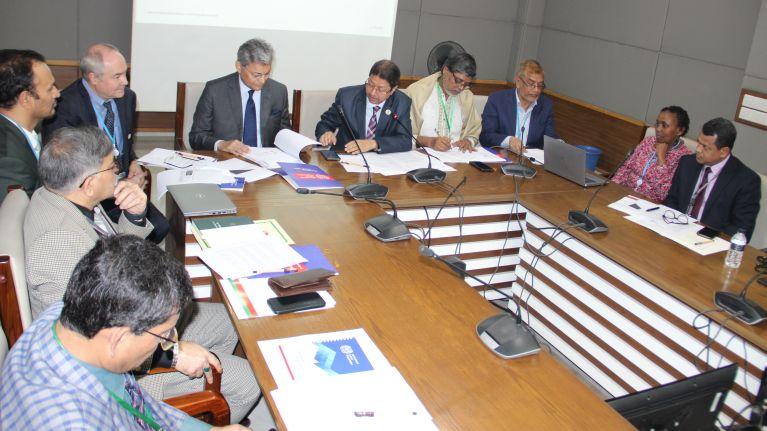
Story
01 April 2024
Courage over fear: Surviving child abuse and violence
In Barishal Sadar's Bangladesh Small and Cottage Industries Corporation (BSCIC) Industrial Zone, the harsh realities of poverty weigh heavily on its residents, where marginalized families struggle to make ends meet. In the face of poverty, many families cannot provide the basic needs for their children, leaving them vulnerable to the perils of an often-unsafe childhood. Adding to their plight is the prevalence of harmful social practices such as child marriage, child labor, child abuse, child trafficking, drug addiction, and Gender Based Violence (GBV), which lurk ominously in the shadows. These dangers pose a constant threat to the children of this community, exposing them to a world fraught with uncertainty. In this environment, the need for external intervention is palpable. Empowering vulnerable children and adolescentsResponding to this pressing need, UNICEF, jointly with the Ministry of Youth and Sports (MoYS), initiated the Sports for Development (S4D) programme for vulnerable children and adolescents. It serves as a beacon of hope for these children, keeping them away from violence, exploitation, abuse, and neglect in an otherwise bleak landscape.The S4D programme is not just about sports; it is a lifeline for these children, offering them a sanctuary where they can learn and grow in a safe and nurturing environment. Through a carefully curated curriculum, children are coached in self-defense techniques and are engaged in a variety of sports, including football, volleyball, kabaddi, and swimming. Beyond the physical aspect, the programme equips them with invaluable life skills, empowering them to navigate the challenges of their environment with confidence and resilience. It also teaches them the skills needed to escape hands, grabs, and any other form of restraint. Farzana getting trained in self-defense from Tinny, her dedicated trainer in the S4D program, fostering healthy development and resilience against harmful practices like child abuse and gender violence. Farzana is one of the participants in the S4D programme. She is a spirited 13-year-old whose determination serves as a testament to the programme's impact. ‘I am learning how to defend myself if someone attacks me,’ she explains, highlighting the newfound sense of confidence she has gained through the programme. She regularly undergoes self-defense training with around 50 other children and adolescents aged 6 to 18, mostly girls, in the open field inside the BSCIC Industrial Zone in Barishal Sadar. For countless others like Farzana, the S4D programme is more than a means of physical protection, it is a catalyst for personal growth and transformation.Self-defense for a stronger tomorrow‘May it be in this country or any other location in the world, everywhere children and adolescents face challenges - especially if they are subjected to harassment or abuse,’ says 23-year-old trainer, Nawrin Akter Tinny. ‘Girls are more vulnerable in such cases because they are easy targets for abusers and assaulters. Learning basic self-defense skills has become a necessity, not only for their safety but also for their cognitive and physical development. In addition to building confidence, it helps a child grow into a healthy adult, both physically and mentally,’ she continues.Providing these children with the right self-defense tools is essential. In addition to keeping them safe, self-defense training gives them a sense of empowerment. Furthermore, it teaches them critical thinking skills and encourages them to take responsibility for their own safety including others'. ‘I will protect myself, my friends, my mother and my sister if someone tries to hurt us anyway,’ exclaims Lamiya, another young student of this programme, in excitement and joy at learning all the seven self-defense moves from the training session.Through sports, children learn how to practice, lead, and play together. As their health improves, they become stronger and learn how to be respectful to each other. Most importantly, by engaging in these activities, they boost their passion for life. ‘Seeing children's smiles gives a meaning to my work. The impact of sports on children is so magical,’ expresses Tinny with admiration. In the face of adversity, programmes like Sports for Development (S4D) stand as a testament to the transformative power of sports, offering a glimmer of hope in the darkest of times. Transforming vulnerability into courageThe S4D programme has made significant strides in reaching out to the community in Barishal. Four dedicated trainers, assisted by Community Mobilizers (CMs) and Community Facilitators (CFs), trained 100 participants for four days, of which 70% are girls. With their assistance, parents, community members, and caregivers are now encouraged to attend awareness and training sessions, fostering a sense of collective responsibility in safeguarding their children's rights and preventing harmful social practices from impeding their growth and development. Since April 2022, the S4D programme has reached nine million people including children, adolescents, parents, and community people across the country.
1 of 5
Story
01 April 2024
Annual profits from forced labour amount to US$ 236 billion, ILO report finds
GENEVA (ILO News) – Forced labour in the private economy generates US$236 billion in illegal profits per year, a new report from the International Labour Organization (ILO) has found.The total amount of illegal profits from forced labour has risen by US$64 billion (37 per cent) since 2014, a dramatic increase that has been fuelled by both a growth in the number of people forced into labour, as well as higher profits generated from the exploitation of victims.The ILO report, Profits and Poverty: the economics of forced labour, estimates that traffickers and criminals are generating close to US$10,000 per victim, up from US$8,269 (adjusted for inflation) a decade ago.Total annual illegal profits from forced labour are highest in Europe and Central Asia (US$84 billion), followed by Asia and the Pacific (US$62 billion), the Americas (US$52 billion), Africa (US$20 billion), and the Arab States (US$18 billion).When illegal profits are expressed per victim, annual illegal profits are highest in Europe and Central Asia, followed by the Arab States, the Americas, Africa and Asia and the Pacific.Forced commercial sexual exploitation accounts for more than two-thirds (73 per cent) of the total illegal profits, despite accounting for only 27 per cent of the total number of victims in privately imposed labour.These numbers are explained by the huge difference in per victim profits between forced commercial sexual exploitation and other forms of non-state forced labour exploitation – US$27,252 profits per victim for the former against US$3,687 profits per victim for the latter.After forced commercial sexual exploitation, the sector with the highest annual illegal profits from forced labour is industry, at US$35 billion, followed by services (US$20.8 billion), agriculture (US$5.0 billion), and domestic work (US$2.6 billion). These illegal profits are the wages that rightfully belong in the pockets of workers but instead remain in the hands of their exploiters, as a result of their coercive practices.There were 27.6 million people engaged in forced labour on any given day in 2021. This figure translates to 3.5 people for every thousand people in the world. Between 2016 and 2021 the number of people in forced labour increased by 2.7 million.“People in forced labour are subject to multiple forms of coercion, the deliberate and systematic withholding of wages being amongst the most common. Forced labour perpetuates cycles of poverty and exploitation and strikes at the heart of human dignity. We now know that the situation has only got worse. The international community must urgently come together to take action to end this injustice, safeguard workers' rights, and uphold the principles of fairness and equality for all,” stated ILO Director-General, Gilbert F. Houngbo.The report stresses the urgent need for investment in enforcement measures to stem illegal profit flows and hold perpetrators accountable. It recommends strengthening legal frameworks, providing training for enforcement officials extending labour inspection into high-risk sectors, and better coordination between labour and criminal law enforcement.Yet forced labour cannot be ended through law enforcement measures alone, enforcement actions must be part of a comprehensive approach that prioritizes addressing root causes and safeguarding victims, underlines the report.The Protocol of 2014 to the Forced Labour Convention, 1930, and the Forced Labour (Supplementary Measures) Recommendation, 2014 (No. 203) provide a strategic framework for comprehensive action.
1 of 5
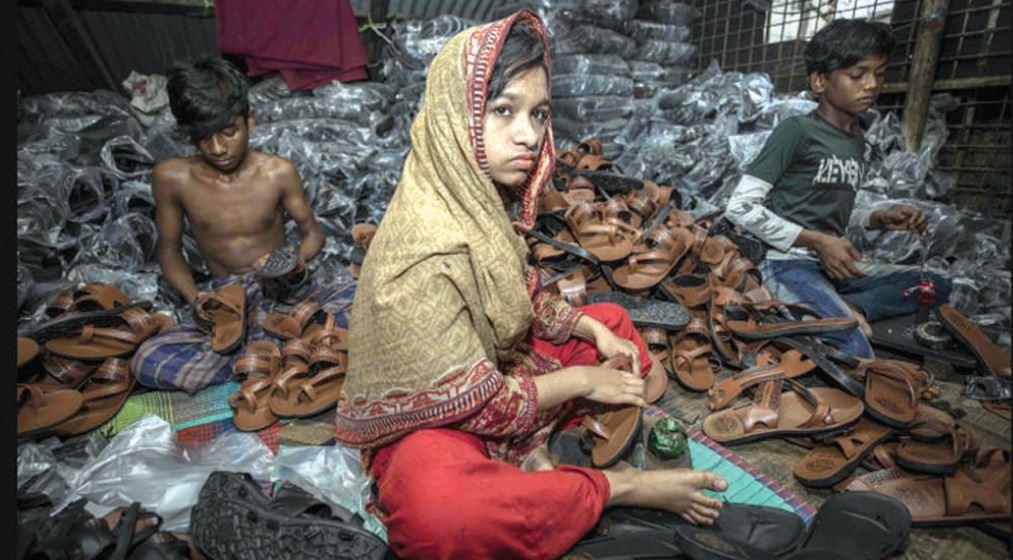
Press Release
17 March 2024
Bailey Road restaurant and other recent fire incidents show again how enforcement, prevention and safety culture is needed to keep work and public places safe
The ILO is deeply saddened by the tragic loss of life of at least 46 individuals at the Green Cozy Cottage Shopping Mall on Bailey Road on 29 February 2024 and the recent gas cylinder fire in residential are in Gazipur on 13th of March 2024. The ILO extends its heartfelt condolences and solidarity to the families of the victims and the injured, emphasizing the urgent need for improved safety measures, regulatory reforms, and strict enforcement to prevent such tragedies in the future. These incidents illustrate the urgent need for both Bangladesh’s authorities and building owners to ensure strict adherence to safety regulations and the meticulous enforcement of building codes to keep workers safe. The tragic Bailey Road fire, originating from the restaurant in the Green Cozy Cottage Shopping Mall, underscores the devastating consequences of lax oversight and inadequate safety measures in commercial buildings. The absence of fire exits, fire extinguishing systems, and proper evacuation routes, despite prior warnings, has resulted in a staggering loss of life and injuries. This serves as a stark reminder that immediate action must be taken to address structural failures, close loopholes in building codes, and prioritize the safety of people in and around buildings. Furthermore, this incident underscores the imperative for an efficient industrial and enterprise safety framework, along with a robust enforcement and training system, to guarantee a systematic approach to mitigation, preparedness, response, and recovery from all potential hazards. Enhanced collaboration and partnerships between government departments, employers, workers' representatives, and civil society are crucial in achieving this goal. The need for a well-coordinated effort to prioritize safety measures, implement comprehensive training programs, and enforce regulations becomes evident, aiming not only at preventing such tragic incidents but also ensuring a resilient and secure environment for workers and the community at large. The ILO is actively collaborating the Government of Bangladesh and other stakeholders to have a fully coordinated industrial safety framework, ensuring the optimal functionality of the Industrial Safety Units across all sectors to strengthen safety inspections. ILO will also support the Government of Bangladesh to update and implement occupational safety and health (OSH) regulatory and policy frameworks and implement the National Plan of Action on OSH. By leveraging these efforts, the goal is to enhance safety standards across all sectors, ensuring a safer working environment for all workers in Bangladesh. It is our hope that this tragic incident will lead to ownership from all stakeholders to approach the task of addressing safety deficiencies in workplaces across the country with renewed determination and urgency.
1 of 5
Press Release
17 March 2024
The Government expands social service workforce by 40 per cent, supported by UNICEF, to strengthen child protection services in Bangladesh
DHAKA, 14 March 2024 - The Government of Bangladesh, supported by UNICEF, has hired more than 1,200 social workers in child protection services. This notable initiative underscores the importance of ensuring the welfare of children and families across the nation. As a first step towards their integration in the Child Protection Social Services, today the Department of Social Services (DSS) and UNICEF jointly completed a 3-day long orientation Training of Trainers (ToT) in Dhaka for the social workers. This program is designed to equip a carefully chosen group of social workers with the knowledge and skills needed to introduce new recruits in Bangladesh to the field. Additionally, it will enhance their ability to offer essential services in critical areas such as child protection, support for families, emergency response, and the implementation of child rights policies. The goal of this initiative is to cultivate a highly skilled workforce, thereby enhancing the quality of services provided and broadening the availability of protective services delivered by social workers. "The Government of Bangladesh, under the visionary leadership of Prime Minister Sheikh Hasina is committed to safeguarding the children of Bangladesh from harm. The recruitment of the new batch of social workers is a testament to our commitment towards enhancing the nation's child protection system," said Dr. Dipu Moni, Hon’ble Minister, Ministry of Social Welfare. "We appreciate UNICEF's commitment to support the government’s efforts, enhancing service providers' capacity, and ensuring every child receives the care and protection they deserve," she added. "Children are the future; protecting them is critical to creating a prosperous nation. The European Union welcomes the commitment of the Government of Bangladesh to invest in child protection by boosting the social services workforce by 40%. We have been working in the social services field with the Government and likeminded partners over the past 20 years, and we are proud to see the impact of our joint efforts", says the EU Ambassador to Bangladesh, Charles Whiteley. “It is important to increase the number of social workers in child protection, but it is equally important to equip them with the right information and knowledge, as they have a critical role to offer essential care and support to those experiencing violence,” said Sheldon Yett, UNICEF Representative to Bangladesh. Despite the recruitment of new social workers, challenges persist, including the prevalence of child labor, inadequate birth registration, children in institutional care and lacking family support, and high rates of child marriage. UNICEF emphasizes the importance of addressing these issues through collaborative efforts among the government, civil society, and international partners. Additionally, there is a need for ongoing investment in human resources and the development of specialized training programs to meet the evolving needs of vulnerable children and families. UNICEF calls on the government to prioritize the further expansion and empowerment of the child protection workforce to effectively support the country's vulnerable child population. Together with the European Union and other stakeholders, UNICEF remains committed to building a comprehensive national child protection system that ensures the rights and well-being of every child in Bangladesh. ###For more information please contact:Farjana Sultana, UNICEF Bangladesh, fasultana@unicef.org Faria Selim, UNICEF Bangladesh, fselim@unicef.org
1 of 5
Press Release
13 March 2024
UN and partners seek $852.4m to support Rohingya refugees and Bangladeshi hosts
The 2024 Joint Response Plan for the Rohingya Humanitarian Crisis is being launched under the leadership of the Bangladeshi authorities. The funding appeal seeks $852.4 million to reach some 1.35 million people including Rohingya refugees and host communities. The plan and related financial needs is being presented to donors in Geneva by Masud Bin Momen, Foreign Secretary of Bangladesh; Mohammad Tofazzel Hossain Miah, Principal Secretary to the Bangladesh Prime Minister; Filippo Grandi, UN High Commissioner for Refugees; and Amy Pope, Director General of the International Organization for Migration. International solidarity with Bangladesh and refugee protection is needed more than ever as the conflict in Myanmar escalates. The Joint Response Plan brings together 117 partners, nearly half of them Bangladeshi organizations. It aims to help some 1 million Rohingya refugees in Cox’s Bazar and on the island of Bhasan Char, and 346,000 from host communities, with food, shelter, health care, access to drinkable water, protection services, education and livelihood opportunities and skills development. Some 95 per cent of Rohingya households in Bangladesh are vulnerable and remain dependent on humanitarian assistance. Sustained assistance is critically and urgently needed, particularly by women and children, who make up more than 75 per cent of the targeted refugee population, and face heightened risks of abuse, exploitation and gender-based violence. More than half of the refugees in the camps are under 18, languishing amidst limited opportunities for education, skills-building and livelihoods. The Government of Bangladesh, local communities and aid agencies need sustained international support to respond to increasing needs as this humanitarian crisis remains largely out of the international spotlight. Underfunding in previous years has had serious implications as Rohingya women, children and men -- who fled to Bangladesh to escape violence and persecution in Myanmar -- struggle to meet basic needs and their plight risks slipping into obscurity. Rohingya refugees remain in limbo relying on humanitarian assistance to survive in crowded camps plagued by insecurity and natural disasters. The international community must continue funding life-saving and life-sustaining assistance to refugees in the camps, investing in education, skills training and livelihood opportunities. This is a lifeline to refugees struggling to meet their basic needs and supplement limited humanitarian assistance. Steps are also needed to ensure pledges made at the Global Refugee Forum in Geneva in December are fulfilled. These included advancing enhancing self-reliance for Rohingya to provide hope and reduce their compulsion to take dangerous boat journeys. FOR MORE INFORMATION PLEASE CONTACT:Mostafa Mohammad Sazzad Hossain; hossaimo@unhcr.orgShari Yasmin Nijman; nijman@unhcr.org
1 of 5
Press Release
12 March 2024
UN urged to assist in addressing post-LDC challenges
UN Resident Coordinator Ms Gwyn Lewis had a meeting with ICC Bangladesh President Mahbubur Rahman at ICC Bangladesh Secretariat on Sunday, says a statement.At the meeting, Ms Lewis was briefed about the activities of ICC HQs and ICC Bangladesh. They discussed the challenges to be faced by Bangladesh after its graduation to Middle-Income country in 2026.ICC Bangladesh President Mahbubur Rahman said that the relationship between Bangladesh and the United Nations started during the initial stage of Bangladesh's liberation war in 1971.Mr Rahman mentioned that Bangladesh has set out an ambitious journey path to transform into a Smart-Bangladesh High-Income Country by 2041, as delineated in its Perspective Plan (2021-2041). The plan for achieving the vision -- the Perspective Plan 2021-2041 -- defines the targets: achieving Upper-Middle Income Country Status and eliminating extreme poverty by 2031, and eradicating poverty altogether while achieving High-Income Country status by 2041.As part of this trajectory, Bangladesh has fully committed to achieving the SDGs, and embraced the Secretary-General's call for a "Decade of Action" to accelerate progress toward the achievement of the 2030 Agenda, he added.The ICCB President urged the UN Resident Coordinator to extend all-out assistance and cooperation to Bangladesh to overcome the challenges after the LDC graduation.He said that UN agencies have been supporting the government in various projects in the field of sustainable development solutions, poverty alleviation, disaster management, peace, good governance, police reform, human rights, environment, climate change, reproductive health, family planning etc.Over the next five years, he said, progress towards this ambitious political, economic, and social development vision will be delivered through the 8th Five-Year Plan.This medium-term development strategy comes at a time when Bangladesh looks to promote a strong and resilient recovery from the COVID-19 pandemic, sustain and build on its economic growth, and put the country on track to achieve the SDGs, Middle-Income Country Status, and the elimination of extreme poverty by 2030-31, Mr. Rahman noted.In response, UN Resident Coordinator Ms. Gwyn Lewis said that the United Nations Sustainable Development Cooperation Framework ("Cooperation Framework") represents the UN development systems' collective response to support Bangladesh in addressing key development priorities and challenges to the achievement of the objectives of the 8th Five-Year Plan, leading to the achievement of the 2030 Agenda, its SDGs, and the Perspective Plan for 2041.The UN looks forward to working jointly with the International Chamber of Commerce Bangladesh in addressing various development issues, she added.Considering the potential change in the development finance landscape due to Bangladesh's graduation from Least Developed Country (LDC) category in 2026, the UN has placed a particular emphasis on development effectiveness through different instruments in the Cooperation Framework, which will complement the public financial management efforts of different international financial institutions and multilateral development banks, she added.ICCB Vice President A. K. Azad said Bangladesh stands to lose a number of international support measures associated with LDC status, namely preferential market access under LDC-specific schemes.Bangladeshi garment exporters rely on the European Union's 'Everything But Arms (EBA)' scheme for duty-free, quota-free access to the region's markets, he said, adding that any measures to extend or replace EBA could prove critical in smoothing the transition. He sought UN's support in this regard.ICCB Vice President Naser Ezaz Bijoy said the climate change impact is posing a severe threat to Bangladesh's agriculture as well as to the overall economy. As a result, annual GDP is likely to shrink by 1.0 to 2.0 per cent.Required investment is crucial as investment of US $ 1.2 billion within 2030 could save $11.6 billion by 2030, he added.He urged more UN investments and programmes designed to assist Bangladesh in climate adaptation.During the meeting, a Memorandum of Understanding (MoU) was signed between United Nations Global Compact Network Bangladesh (UN-GCNB) and the International Chamber of Commerce (ICC) Bangladesh.The purpose of the MoU is to ensure growth and value addition of Sustainability Projects countrywide through Private Sector engagement for future market development, to facilitate and empower members of the ICC in accessing global networks and resources through UN-GC platforms on Sustainable business practices; and to provide capacity building/training to support the sustainability journeys in the private sector of Bangladesh.The meeting was also attended by ICCB Executive Board Members Abdul Hai Sarkar and Anwar-ul-Alam Chowdhury (Parvez); UN Global Compact Executive Director Asia Pacific & Ocenia Shahamin S. Zaman, ICCB Banking Commission Chairman Muhammad A. (Rumee) Ali, ICCB Secretary General Ataur Rahman, former Bangladesh Bank Executive Director Md. Ahsan Ullah; UN Senior Development Coordinator Officer and Strategic Planner Louise Barber and Development Coordination Officer/Economist Md. Mazedul Islam; UN Global Compact Network Bangladesh Coordinator Stakeholder Engagements Juliana Awo Quist Lawson; ICCB General Manager Ajay Bihari Saha and Deputy General Manager Syeda Shahnewaz Lotika.
1 of 5
Press Release
10 March 2024
Fearless in bringing change
Sheuly Khatun, 36, hailing from an impoverished background in Satkhira, faced dire circumstances when her husband abandoned her, leaving Sheuly to fend for her two children with no income.Thanks to financial assistance from UNDP Bangladesh's "SWAPNO" project, Sheuly, who once struggled to sustain herself and her children, now manages an ice cream factory, supporting her own family as well as six destitute women.On the occasion of International Women's Day 2024, six women, including Sheuly Khatun, were awarded "Nirbhaya" (fearless) by The Daily Star and UNDP Bangladesh yesterday.The others are Asma Begum of Dhaka, Nazma Akter Reshmi of Cox's Bazar, Nipu Tripura of Khagrachhari, Poly Khatun of Satkhira, and Suraiya Khan of Khulna.They were recognised for championing the cause of women changemakers from grassroots communities and handed crests and certificates during a ceremony at The Daily Star Centre in the capital. This was the fourth edition of the "Nirbhaya" initiative.Asma Begum, 40, was honoured for her efforts to restore greenery by planting trees in the capital's slum areas, while 23-year-old Nazma Akter Reshmi was recognised for her innovative business venture producing fish powder and crackers.Nipu Tripura, born in Rangamati, once uncertain about her future during the pandemic, now produces mushrooms on a large scale, generating 12,000 spawns per month. She has created job opportunities for five other women.Poly Khatun, affectionately known as "Pani Apa" in her community, received training in installing and maintaining rainwater harvesting systems. She diligently cleans the catchment areas, gutters, and filters of numerous households in her village.With just Tk 7,000 from UNDP's project, Suraiya Khan, a survivor of child marriage, has become a successful egg entrepreneur, setting an example for many women in her village.At the event, Stefan Liller, resident representative of UNDP Bangladesh, said learning about the Nirbhaya's experience was deeply inspiring."Not only to us, but to all the people who will be reading about your journeys, about overcoming adversities, challenging discriminatory norms, and your triumphs to help uplift others in your communities and beyond," he said, addressing the Nirbhayas."Let us remember that achieving a sustainable and equitable world for our future generation requires guaranteeing the rights and freedom of women and girls across all aspects of life," he added.Mahfuz Anam, editor and publisher of The Daily Star said the confidence displayed by the Nirbhayas should serve as an example for others."I extend my salute to you and find much inspiration in your confidence. For those facing financial hardships, it is very difficult to overcome such challenges and achieve success. And it is tougher for women," he said."It is a weakness on our part that we fail to respect women, and often harbour the perception that we are superior to women -- this mindset infects us, leading to discrimination against women in society," he added.Recognising the invaluable contributions of women to both familial and societal life, he affirmed, "The Daily Star is steadfast in its commitment to combating discrimination against women, actively championing their achievements by highlighting their struggles and successes in our publications."Sharmin Islam, leader of the UNDP gender team, said the Nirbhaya award commenced after the onset of the pandemic in 2021, when they honoured five women who played crucial roles in raising awareness about densely populated slum areas and impoverished regions of Dhaka.
1 of 5
Latest Resources
1 / 11
Resources
17 March 2024
Resources
01 February 2024
1 / 11

